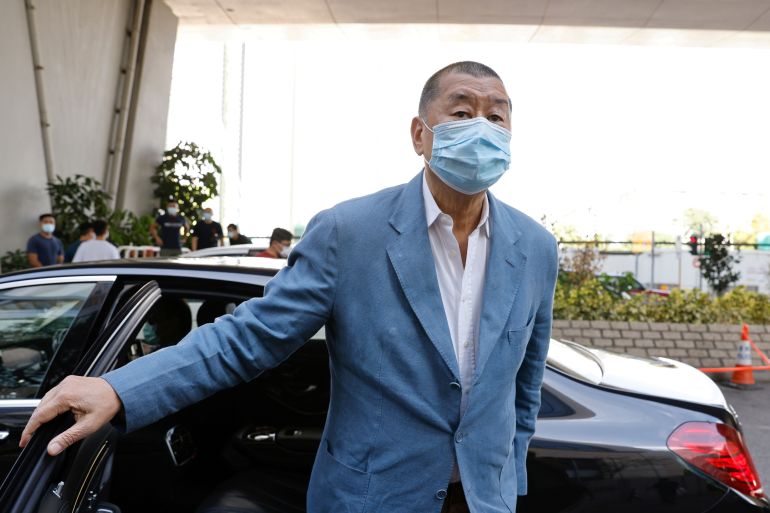Jimmy Lai charged under Hong Kong’s national security law
Media mogul is the highest profile activist to be charged under new law as teenage activist is found guilty in China flag insult case.

Prominent media tycoon and pro-democracy campaigner Jimmy Lai has been charged under Hong Kong’s national security law, local media reported on Friday, while a teenage activist has been found guilty of insulting China’s national flag.
The Hong Kong Police confirmed that a 73-year-old man had been charged with offences including “collusion with a foreign country or with external elements to endanger national security” and would appear in court on Saturday.
Keep reading
list of 3 itemsHong Kong’s Jimmy Lai cleared of intimidation charges
‘Blatant suppression’: Hong Kong publisher Jimmy Lai arrested
Lai, an ardent critic of Beijing, would be the highest profile person charged under the sweeping new law imposed on the Chinese-ruled city.
The law has been condemned by the West and human rights groups as a tool to crush dissent.
Suzanne Pepper, a Hong Kong-based American author and political scientist, said that being one of the most prominent people who openly criticised China, it was not surprising that Lai was targeted by the government.
Authorities in Hong Kong and Beijing say the law, which was imposed in June, is vital to plug gaping holes in national security defences exposed by months of sometimes violent anti-government and anti-China protests that rocked the city over the last year.
‘Target of crackdown’
Lai was denied bail earlier this month following his arrest on a separate charge of fraud related to the lease of a building that houses his Apple Daily, an anti-government tabloid.
Apple Daily was also raided by authorities in August, in what is seen as an act of intimidation by authorities.
Pepper, the political scientist, noted that Lai’s publication is one of the remaining “overtly anti-communist, anti-China” news organisation left in Hong Kong that has refused to tone down its coverage of the protests and the crackdown.
In an interview with Hong Kong Free Press on Friday, Mark Simon, a close aide to the Lai family, said the latest development demonstrates “the weakness of the fraud charges.”
A person convicted of the offences spelled out by the police could be sentenced to three years to life imprisonment, according to the new law.
Maya Wang of Human Rights Watch noted that what Lai has been accused of doing are “completely peaceful” activities that are now being criminalised under law, broadening the scope of what is prohibited activity.
“It’s really the first case of someone being charged that way because previous individuals have either been arrested at protests or they are part of a political group,” she said, warning that lawyers and the press could be targeted next.
“Right now, Hong Kong is in full crackdown mode and is striking at the pillars of the pro-democracy movement and civil society and what constitutes Hong Kong’s freedoms,” Wang added.
“I think it’s a misguided strategy and it will increase people’s resistance to another boiling point to where we will see some sort of explosion of anger.”
Lai had been a frequent visitor to Washington, where he has met officials, including Secretary of State Mike Pompeo, to rally support for Hong Kong democracy, prompting Beijing to label him a “traitor”.
News of the charges comes as authorities intensify a crackdown on opposition forces that has seen lawmakers dismissed and high-profile democracy activists such as Joshua Wong jailed.
Earlier on Friday, 19-year-old Tony Chung, who led a now-disbanded pro-democracy group, was found guilty of insulting China’s flag and of unlawful assembly.
Chung was arrested in October near the US consulate. There were speculations that the police moved to stop him from asking for asylum to the US.
Chung will be sentenced on December 29. He could face the maximum sentence of between three to five years in prison.
With reporting by Erin Hale.